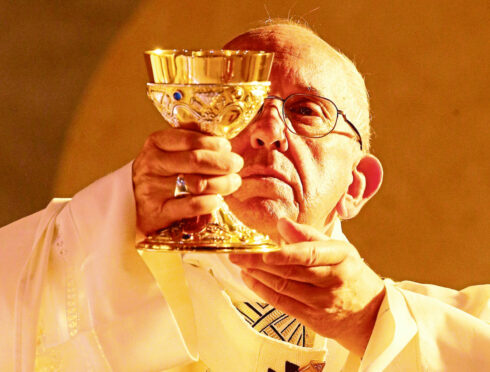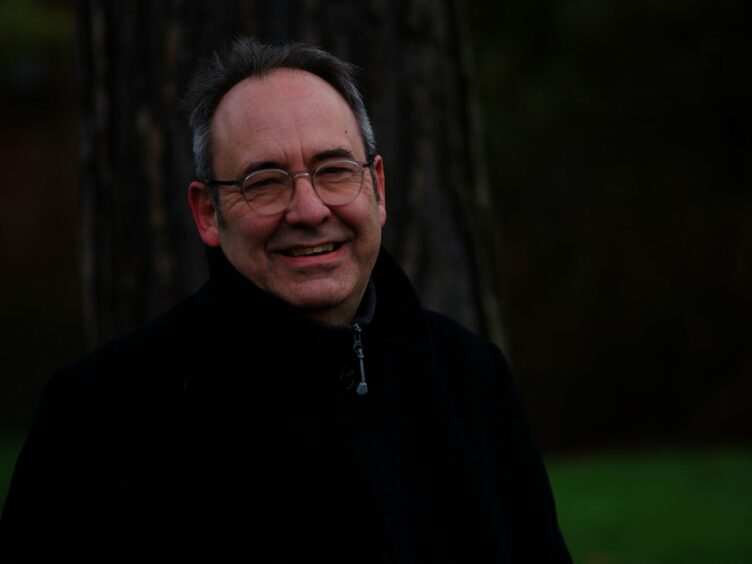
The first time broadcaster Tom Morton encountered alcohol was when he was 10 years old at Bethany Gospel Hall in Troon. It was the sweet, pungent scent he noticed first. The tasting would come years later.
“It was an overwhelming smell of I don’t know what, but it was a very exciting smell,” he recalled. “I grew up in a family where, as a child, alcohol wasn’t consumed, but I discovered this smell was what was used as the communion wine.
“As a young teenager, me and my pal raided the bins at the church to see what it was, and we discovered empty bottles of Old Tawny wine, an equivalent to Buckfast or Eldorado – really strong fortified pseudo-sherry.
“When I became a communicant member at 16 I was able to taste it and it was seriously strong stuff. That was my introduction to wine of any kind.”
Sober through his teenage and student years Morton only began to investigate alcohol in his 20s.
Thirty years ago, in 1992, he released bestselling book Spirit Of Adventure, detailing a six-week motorbike trail around Scotland’s whisky distilleries, going from novice to expert and, eventually, becoming a whisky taster and judge. Now, his new book, Holy Waters, examines the links between religion and alcohol – the spirits and the spiritual, so to speak.
“One of the crucial things, from an anthropological point of view, is it’s possible to argue that religion is a product of agricultural societies and, as humanity began to organise itself to produce food, then the production of alcohol became an obvious thing to do and so was associated with religion from the word go,” Morton said.
“As religion became a part of the way we organised ourselves and lived, then alcohol was present there as well, and I suppose religion wanted to do two things – use alcohol to enhance its own appeal and rituals, but also to control people’s consumption so it didn’t get out of hand. Notably, nobody got drunk at church services.
“The relationship between religion and alcohol is deep. There are different levels and elements to the relationship, both in how it is produced from within the religious community and how the religious community reacts to it. That’s worldwide, from voodoo in the Caribbean to reformed Presbyterian churches in Scotland to Shinto temples in Japan.
When asked if religion and alcohol are so entwined that they need each other, Morton, who is also a councillor on Shetland and a funeral celebrant, said: “There is an element of religious experience that is about – not hallucinations exactly – but when you walk into a beautiful church building with stained glass and all the atmosphere of it, like the rituals and the beautiful clothes and the architecture, it’s about changing emotions and minds.
“In a lot of ways, alcohol isn’t just a symbol in religion but something that also changes people’s minds. So that alteration or perception is perhaps one similarity between the two. Alcohol production and religion have always walked hand in hand. It is no coincidence that monasteries have been a centre for alcohol production for centuries and that still goes on, such as the Trappist tradition of beer production.”
And also Buckfast Tonic Wine – no stranger to the off-licences of the central belt – which is made by monks in Devon. He said: “That’s an important chapter in the book. When you delve into the amount of court cases of domestic abuse and violence associated specifically with its consumption, it’s disturbing. I know the people at the abbey and their PR operation, which is slick and powerful, hate this being mentioned but it’s simply a fact.”
Even in cultures where alcohol is not seen to be consumed for religious reasons, there is still an active industry and market. “One of the most interesting is in Pakistan,” said Morton. “There is a liberal attitude towards alcohol in various parts and the restrictions apply only to adherence of Islamic faith, so it’s produced there too, most notably by Murree, a huge organisation, but it’s not allowed to export its goods.
“There was a big story years ago when Bruce Willis’ daughter was photographed drinking when underage, and it was Murree she was drinking and everyone wondered how she managed to get her hands on it in New York.
“There had been a plan at one point to export Murree beer and the motto was going to be ‘Have a Murree with your curry’, which would have been brilliant. It was only during my research that I discovered Kingfisher and Cobra beers were specially brewed with smaller bubbles so that they don’t interfere with the curry too much.”
The story that means most to him, though, is that of Jessie Roberta Cowan, from Kirkintilloch, which he first came across in the manager’s office at Fort William’s Ben Nevis Distillery in 1991.
Cowan had taken in a Japanese student lodger, Masataka Taketsuru, in 1919 and they quickly fell in love, marrying in January of the following year. They moved to Japan soon after, where Cowan – known as Rita – embraced the culture, adopted two children, and helped her husband start Japan’s first malt whisky distillery, which eventually became powerhouse brand Nikka.
She endured harassment and accusations of spying during the Second World War, but by the time she died young in 1953 the Japanese people adored her and lined the streets for her funeral.
Morton said: “In Japan, the story is hugely important and there are visitor trails, a museum and even a soap opera about her life, but there’s not much said about her over here. I’ve always been fascinated by it.
“People have said to me that it’s a story of industrial espionage. When Taketsuru came to Scotland he was regarded with extreme suspicion and probably rightly, because he left with a Scottish wife and all the secrets of Scotch whisky production.
“The story of Rita’s funeral is quite moving. After a cremation, a formal funeral was held and the townspeople of Yoichi lined part of the cortege route with garlands of flowers in her honour.
“The new pastor of Yoshioka, the local church, having observed that she was baptised and devout, waived his fees after witnessing the huge outpouring of grief. He regarded it as a great witness to the power of Christianity, then, as now, a minority religion in Japan.”
With tasting notes for each drink covered in the book, Morton hopes readers will enjoy a tipple as they read it.
“I wouldn’t recommend people to drink their way through the book in a oner – that would be a recipe for disaster,” he smiled. “Discrimination and moderation in drinking is the key, although there’s dangers in that, too. For a long time I was involved in whisky-tasting events and judging competitions, and you could see some so-called experts were simply alcoholics who were fonder of the effects than of the taste.
“It’s possible to become so pretentious that you lose sight of the fact that whisky and wine are alcoholic and will change perceptions.”
Holy Waters, by Tom Morton, is out on Tuesday from Watkins Publishing

Enjoy the convenience of having The Sunday Post delivered as a digital ePaper straight to your smartphone, tablet or computer.
Subscribe for only £5.49 a month and enjoy all the benefits of the printed paper as a digital replica.
Subscribe